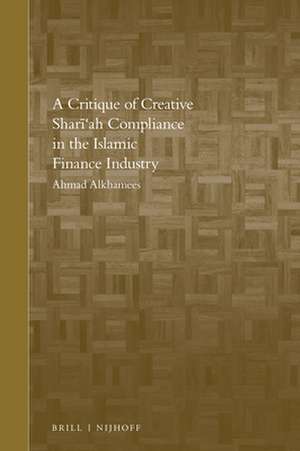A Critique of Creative Shari'ah Compliance in the Islamic Finance Industry: Brill's Arab and Islamic Laws Series, cartea 11
Autor Ahmad A Alkhameesen Limba Engleză Hardback – 15 aug 2017
Preț: 701.13 lei
Preț vechi: 855.04 lei
-18% Nou
Puncte Express: 1052
Preț estimativ în valută:
134.17€ • 143.46$ • 111.86£
134.17€ • 143.46$ • 111.86£
Carte indisponibilă temporar
Doresc să fiu notificat când acest titlu va fi disponibil:
Se trimite...
Preluare comenzi: 021 569.72.76
Specificații
ISBN-13: 9789004344396
ISBN-10: 900434439X
Pagini: 282
Dimensiuni: 155 x 235 x 23 mm
Greutate: 0.56 kg
Editura: Brill
Colecția Brill | Nijhoff
Seria Brill's Arab and Islamic Laws Series
ISBN-10: 900434439X
Pagini: 282
Dimensiuni: 155 x 235 x 23 mm
Greutate: 0.56 kg
Editura: Brill
Colecția Brill | Nijhoff
Seria Brill's Arab and Islamic Laws Series
Cuprins
Acknowledgements
Brill’s Simple Arabic Transliteration System
Glossary of Arabic Terms
Table of Cases
List of Statutes
List of Figures and Tables
Abbreviations
Introduction
1 An Overview of Shariʿah
1.1 Introduction
1.2 Overview of Shariʿah and Its Foundation
1.3 Schools of Thought
1.4 Islamic Legal Ruling
1.5 Main Features of Islamic Finance
1.6 Shariʿah-Compliant Financial Instruments
1.7 The Objectives of Islamic Law
1.8 Conclusion
2 The Form Versus Substance Debate and the Roots of Creative Shariʿah Compliance in Islamic Finance: Why Reinvent the Wheel?
2.1 Introduction
2.2 The Definition of Ḥīlah
2.3 The Origins and the Evolution of Ḥīlah
2.4 Positions on Ḥīlah of Islamic Schools of Thought
2.5 Refuting the Pro-Ḥīlah Arguments
2.6 Conclusion
3 Tawarruq as a Case Study of Creative Shariʿah Compliance
3.1 Introduction
3.2 Definition of Tawarruq and Selection Rationale
3.3 The Development of Tawarruq
3.4 The Differences between Jurisprudential and Organised Tawarruq
3.5 Forms of Tawarruq
3.6 Shariʿah Jurists’ Views on Tawarruq
3.7 Conclusion
4 Standardisation of Fatwās to Reduce Creative Shariʿah Compliance
4.1 Introduction
4.2 Standardisation: A Definition
4.3 Why Is Standardisation Needed?
4.4 Causes of Juristic Differences
4.5 Remedies for Inconsistency
4.6 Conclusion
5 The Impact of Shariʿah Governance Practises on Shariʿah Compliance in Contemporary Islamic Finance
5.1 Introduction
5.2 Shariʿah Supervisory Board Definition
5.3 The Importance of SSBs
5.4 Regulatory Issues Surrounding Shariʿah Supervisory Boards
5.5 Conclusion
6 Public Mechanisms to Remedy Creative Shariʿah Compliance
6.1 Introduction
6.2 Overview and Justification of CSSBs
6.3 Tasks of CSSBs
6.4 The Central Shariʿah Board in Sudan
6.5 The Central Shariʿah Board in Malaysia
6.6 UK Regulators’ Approach towards Shariʿah Governance
6.7 Saudi Regulators’ Approach towards Shariʿah Governance
6.8 Compulsory Disclosure
6.9 Conclusion
7 Private Mechanisms to Remedy Creative Shariʿah Compliance
7.1 Introduction
7.2 Shariʿah Compliance Rating
7.3 Shariʿah Indices
7.4 Private External Shariʿah Auditing Firms
7.5 International Islamic Financial Standards
7.6 Whistle Blowing
7.7 Characterising the Articles of Association
7.8 Conclusion
Conclusion
Bibliography
Brill’s Simple Arabic Transliteration System
Glossary of Arabic Terms
Table of Cases
List of Statutes
List of Figures and Tables
Abbreviations
Introduction
1 An Overview of Shariʿah
1.1 Introduction
1.2 Overview of Shariʿah and Its Foundation
1.3 Schools of Thought
1.4 Islamic Legal Ruling
1.5 Main Features of Islamic Finance
1.6 Shariʿah-Compliant Financial Instruments
1.7 The Objectives of Islamic Law
1.8 Conclusion
2 The Form Versus Substance Debate and the Roots of Creative Shariʿah Compliance in Islamic Finance: Why Reinvent the Wheel?
2.1 Introduction
2.2 The Definition of Ḥīlah
2.3 The Origins and the Evolution of Ḥīlah
2.4 Positions on Ḥīlah of Islamic Schools of Thought
2.5 Refuting the Pro-Ḥīlah Arguments
2.6 Conclusion
3 Tawarruq as a Case Study of Creative Shariʿah Compliance
3.1 Introduction
3.2 Definition of Tawarruq and Selection Rationale
3.3 The Development of Tawarruq
3.4 The Differences between Jurisprudential and Organised Tawarruq
3.5 Forms of Tawarruq
3.6 Shariʿah Jurists’ Views on Tawarruq
3.7 Conclusion
4 Standardisation of Fatwās to Reduce Creative Shariʿah Compliance
4.1 Introduction
4.2 Standardisation: A Definition
4.3 Why Is Standardisation Needed?
4.4 Causes of Juristic Differences
4.5 Remedies for Inconsistency
4.6 Conclusion
5 The Impact of Shariʿah Governance Practises on Shariʿah Compliance in Contemporary Islamic Finance
5.1 Introduction
5.2 Shariʿah Supervisory Board Definition
5.3 The Importance of SSBs
5.4 Regulatory Issues Surrounding Shariʿah Supervisory Boards
5.5 Conclusion
6 Public Mechanisms to Remedy Creative Shariʿah Compliance
6.1 Introduction
6.2 Overview and Justification of CSSBs
6.3 Tasks of CSSBs
6.4 The Central Shariʿah Board in Sudan
6.5 The Central Shariʿah Board in Malaysia
6.6 UK Regulators’ Approach towards Shariʿah Governance
6.7 Saudi Regulators’ Approach towards Shariʿah Governance
6.8 Compulsory Disclosure
6.9 Conclusion
7 Private Mechanisms to Remedy Creative Shariʿah Compliance
7.1 Introduction
7.2 Shariʿah Compliance Rating
7.3 Shariʿah Indices
7.4 Private External Shariʿah Auditing Firms
7.5 International Islamic Financial Standards
7.6 Whistle Blowing
7.7 Characterising the Articles of Association
7.8 Conclusion
Conclusion
Bibliography
Notă biografică
Ahmad Alkhamees (Ph.D. (2014), University of Warwick), holds degrees in both Islamic law and English law. He is a published author on comparative law and Islamic law. He is a Co-founder of Harasani & Alkhamees Law Firm in Jeddah, Saudi Arabia, certified arbitrator, and a former judge in Riyadh’s General Court.











